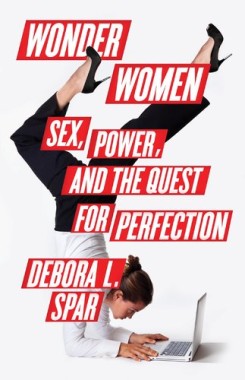Why do women who have what they think other women want–the magical trifecta of ALL: husband, kids, big job―feel the need to tell women who don’t “have it all” (whether they want it or not) how to have (or “do”) this elusive ALL?
 And why invent or repurpose words like “leaning in” or “satisficing” (accepting second best―the B+ life, or maybe, if you’re lucky, an A-) to express this so-called analysis in bestselling, or soon to be bestselling books? Who is reading these books ?
And why invent or repurpose words like “leaning in” or “satisficing” (accepting second best―the B+ life, or maybe, if you’re lucky, an A-) to express this so-called analysis in bestselling, or soon to be bestselling books? Who is reading these books ?
Why invoke the legacy of seventies feminism as the main cause for contemporary women’s failure to reach this pinnacle of satisfaction with an S? Perhaps the need to bend the language to express the argument offers a clue to their misreading of a feminism that as I recall had quite other goals.
It would be difficult to find recommendations for climbing the ladder of success in the writings of Simone de Beauvoir, Kate Millett, Shulamith Firestone, or Germaine Greer, to name a few. As I recall the days of feminist consciousness-raising groups, the goal and dream was to find some measure of fulfillment in some realm of our own lives, but also to work for concrete improvement in the lives of other women, perhaps less fortunate. This heartbreaking article about women who, no matter how hard they try, cannot afford a home that is not a communal shelter, is a painful reminder of how relative all success for women is.
I don’t have it all, and I don’t know anyone who does or thinks she does.
We used to complain about men telling us what we want. Now we have to hear it from other women.
